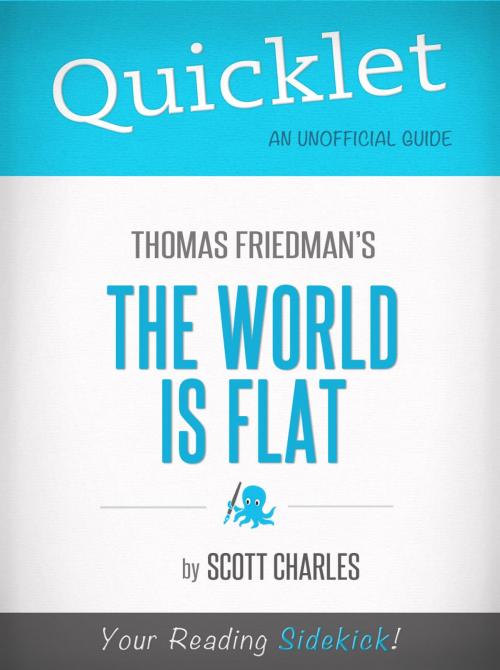Quicklet on Thomas Friedman's The World Is Flat (CliffNotes-like Book Summary)
Nonfiction, Reference & Language, Study Aids, Business & Finance| Author: | Scott Charles | ISBN: | 9781614643630 |
| Publisher: | Hyperink | Publication: | October 10, 2011 |
| Imprint: | Language: | English |
| Author: | Scott Charles |
| ISBN: | 9781614643630 |
| Publisher: | Hyperink |
| Publication: | October 10, 2011 |
| Imprint: | |
| Language: | English |
ABOUT THE BOOK
The World Is Flat: A Brief History of the Twenty-First Century is Thomas Friedman's account of globalization: how it happened, what it means, and what we should be aware of when discussing the subject. Friedmans inspiration for the book came about as he was traveling to India on assignment for the Discovery Channel. The topic of the documentary was outsourcing. It came as something of a shock to Friedman to find out how many tasks actually could be outsourced, from tax preparation to reading X-rays. More shocking was the realization that globalization wasnt just about jobs. It is about culture, hopes, dreams, imaginations, and the future.
If that seems like the rhetoric of romance, so be it. Because that is the way Friedman sees it, and thats the way he wrote it. For Friedman, the confluence of political, social and technological events in the last few decades has been nothing short of astounding. After Bangalore, he is looking at the world through new eyes.
The World Is Flat: A Brief History of the Twenty-First Century was published by Farrar, Straus & Giroux in 2005. The Updated and Expanded edition, reviewed here, was published in 2006.
MEET THE AUTHOR
Scott Charles has over a decades worth of experience as a research analyst. Scott spent 11 years at a Fortune 500 company providing research and analytical services to marketing teams, product managers, R&D staff, and executives. His specialty is doing comprehensive deep dives to support ideation processes, identifying business opportunities, market analysis and business development.
EXCERPT FROM THE BOOK
Thomas Friedman is a controversial author and journalist. Some people dont like his style, some dont like his politics. Ive covered the topic elsewhere, but its necessary to note it here as well. The reason is that The World Is Flat: A Brief History of the Twenty-First Century is serious work. Millions, if not billions, of people are going to live, die, suffer or prosper based on what happens in the next few years. So it should be reviewed seriously, and carefully.
The world map was redrawn after WWI, and its being redrawn again now, only this time its because the principles of open free-markets, supported by a profoundly far reaching communication infrastructure, is driving change. Its not just work that is being exchanged. It is power. And it is happening fast. As the post-WWI restructuring of political boundaries shaped our world for 100 years, and is still doing so, the decisions we make in the next few years will have the same impact on the next 100 years.
ABOUT THE BOOK
The World Is Flat: A Brief History of the Twenty-First Century is Thomas Friedman's account of globalization: how it happened, what it means, and what we should be aware of when discussing the subject. Friedmans inspiration for the book came about as he was traveling to India on assignment for the Discovery Channel. The topic of the documentary was outsourcing. It came as something of a shock to Friedman to find out how many tasks actually could be outsourced, from tax preparation to reading X-rays. More shocking was the realization that globalization wasnt just about jobs. It is about culture, hopes, dreams, imaginations, and the future.
If that seems like the rhetoric of romance, so be it. Because that is the way Friedman sees it, and thats the way he wrote it. For Friedman, the confluence of political, social and technological events in the last few decades has been nothing short of astounding. After Bangalore, he is looking at the world through new eyes.
The World Is Flat: A Brief History of the Twenty-First Century was published by Farrar, Straus & Giroux in 2005. The Updated and Expanded edition, reviewed here, was published in 2006.
MEET THE AUTHOR
Scott Charles has over a decades worth of experience as a research analyst. Scott spent 11 years at a Fortune 500 company providing research and analytical services to marketing teams, product managers, R&D staff, and executives. His specialty is doing comprehensive deep dives to support ideation processes, identifying business opportunities, market analysis and business development.
EXCERPT FROM THE BOOK
Thomas Friedman is a controversial author and journalist. Some people dont like his style, some dont like his politics. Ive covered the topic elsewhere, but its necessary to note it here as well. The reason is that The World Is Flat: A Brief History of the Twenty-First Century is serious work. Millions, if not billions, of people are going to live, die, suffer or prosper based on what happens in the next few years. So it should be reviewed seriously, and carefully.
The world map was redrawn after WWI, and its being redrawn again now, only this time its because the principles of open free-markets, supported by a profoundly far reaching communication infrastructure, is driving change. Its not just work that is being exchanged. It is power. And it is happening fast. As the post-WWI restructuring of political boundaries shaped our world for 100 years, and is still doing so, the decisions we make in the next few years will have the same impact on the next 100 years.















